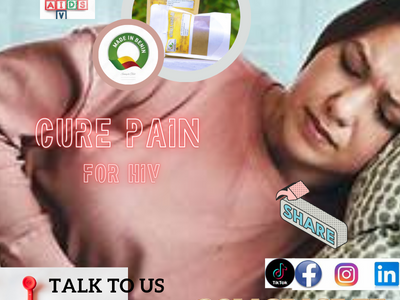
444-How To Cure Pain For HIV Patient
OVERVIEW
HIV treatment has improved, but chronic pain persists in those living with the condition, even those taking antiretroviral therapy (ART). Despite ART reducing HIV levels, pain still affects daily functioning and quality of life. Causes vary and include headaches, joint pain, abdominal cramping, or stomach issues. Effective treatment and understanding the source of pain can improve physical and mental health.
Causes of pain in HIV: Cure Pain For HIV
HIV-infected individuals may experience pain due to various factors, including the virus’s immune system targeting, opportunistic infections, nerve damage, chronic inflammation, drug side effects, and a history of illicit drug use. Despite successful treatment, pain can persist, and those with a history of pain may require higher pain medication doses.
Read about the best diet for HIV Patient
Types of HIV-related pain
HIV-related pain can manifest in a variety of ways. Those with a weakened immune system may experience infections that cause:
- headaches
- body aches
- stomach pain and cramping
Untreated HIV can cause peripheral neuropathy, a common neurological disorder in adults, with older age and smoking increasing the risk.
Some symptoms of peripheral neuropathy include:
- pain in the hands and feet
- muscle weakness in the hands and feet
- numbness or tingling in the extremities
- increased sensitivity to pain
With treatment, HIV still has links to various types of chronic pain, such as muscle and joint pain. This may be more common with age, or in those who previously took older HIV drugs. Some common areas this may affect include the following:
- head
- neck
- back
- legs
Please reach us at http://wa.me//+22967546677
HIV and AIDS resources
Visit our dedicated hub for HIV and AIDS resources. Manage HIV pain with medications and non-drug options, varying depending on cause and type. Treatment plans may include a combination.
ART: Cure Pain For HIV
Consistent ART usage reduces HIV viral load to undetectable levels, reducing opportunistic infections and preventing sex-related transmission. However, certain drugs may increase pain sensitivity or cause discomfort, so consult a doctor to address side effects.
Discuss with a specialist here
Antimicrobials
Antimicrobials can target opportunistic infections if they occur. Depending on the type of infection, this may include antiviral drugs, antibiotics, or antifungal drugs.
Pain medications
For chronic pain, a person may benefit from pain medications to reduce inflammation or improve quality of life. This could involve trying:
Over-the-counter pain medications
A wide variety of pain medications are available over-the-counter (OTC). Some examples include acetaminophen, aspirin, and ibuprofen. Topical pain medicines, such as gels, creams, or patches, are also available for pain in a specific area.
Please speak with a doctor before trying OTC medications to check they are suitable and will not interact with HIV treatments.
Prescription nonopioids
Doctors may suggest prescription drugs for pain relief if OTC drugs are ineffective, particularly nonopioid options, which have less addiction or dependence potential.
Opioids: Cure Pain For HIV
Opioids are powerful pain medications prescribed by doctors only when other options fail. They can cause side effects, risk dependence, addiction, overdose, and progression to illegal opioids. Following the doctor’s instructions is crucial.
Complementary therapies
Other possible ways to relieve or cope with pain include:
- massage
- acupuncture
- physical therapy or yoga
- breathing exercises
- meditation or mindfulness
- pain management courses
- an anti-inflammatory diet
- talk therapies
Joining a chronic pain support group can provide support and helpful pain relief tips. Ensure practitioners are qualified, licensed, and safe, and inform people with HIV about their status before a session.
Home remedies for HIV pain
Some ways to manage HIV-related pain at home include:
- heat therapy, which could involve taking warm baths or using a heat pad
- getting some gentle exercise
- relaxation techniques, such as meditation
- quitting smoking, if applicable
- limiting alcohol consumption
Some herbal remedies may interact with ART. Due to this, it is best to talk to a healthcare provider before taking any herbal products or supplements.
Read about alternative treatments for HIV here.
Summary: Cure Pain For HIV
HIV patients often experience pain due to virus effects, secondary infections, or complications. Chronic pain may be caused by nerve damage, inflammation, or treatment side effects. Doctors can diagnose pain causes and recommend treatments, including medications and complementary therapies.
